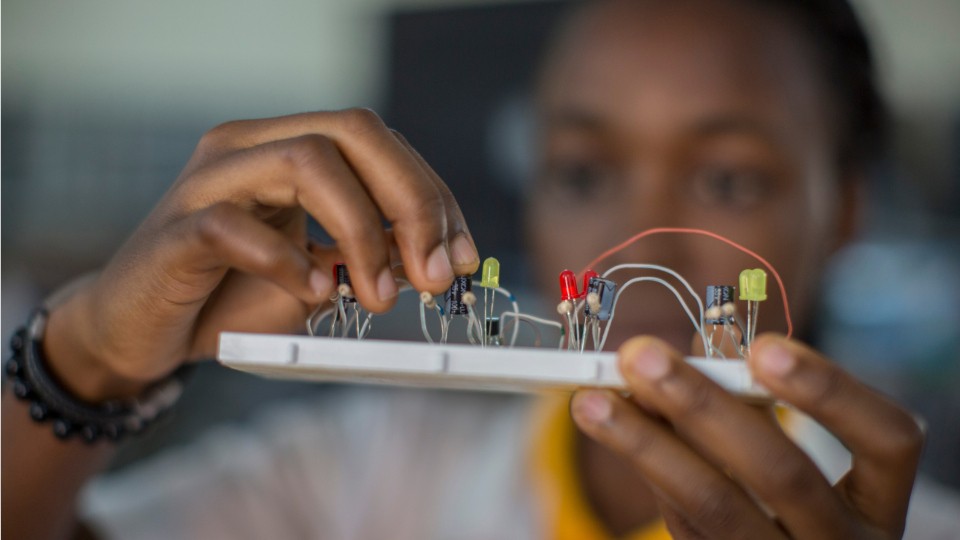Electronics Engineers
Design Engineer, Integrated Circuit Design Engineer (IC Design Engineer), Product Engineer, Test Engineer
 Select a military branch to see samples.
Select a military branch to see samples.
Aerospace Ground Equipment; Airlift/Special Mission Aircraft Maintenance; Airlift/Special Mission Aircraft Maintenance Helper; Airlift/Special Mission Aircraft Maintenance Journeyman, C-20/C-21/C-22/C-37/C-40/E-4/VC-25; Developmental Engineer, Astronautical; Developmental Engineer, General; Developmental Engineer, Tanker; Heavy Aircraft Integrated Avionics Craftsman, C4ISR Mission Systems (E-3, E-4, E-7, EC-130H, RC-135, VC-25); Missile And Space Facilities Craftsman; Missile And Space Systems Electronic Maintenance Craftsman
Army Astronaut; Command and Control Systems Integrator; Cyberspace and Electromagnetic Activities (CEMA) Senior Sergeant (CEMA Sr SGT); Electronic Warfare Specialist; Electronic Warfare Technician; Health Services Maintenance Technician; Intelligence Systems Integration and Maintenance Technician; Satellite Communications Systems Operator-Maintainer; Small Arms/Towed Artillery Repairer; Space Operations
Aviation Engineering Specialty; Electronics Specialty; Marine Safety Specialist Engineer
Electronics Engineer; Ordnance Systems Engineer; Technical Information Operations Officer
Aeronautical Engineering Officer, Aircraft Mechanical, Electronic, Electrical and Safety Equipment; Aircraft Production Officer; Electronic Engineering Plans and Policies Director; Electronic Inspection and Survey Officer; Electronics Engineering Officer; Fire Control Technician; Operations Specialist; Ship's Electronic Material Officer; Training Device Program Coordinator; Weapons Plans and Policies Director
Developmental Engineer; Developmental Engineer, Electrical/Electronic; Developmental Engineer, Systems/Industrial/Human Factors
What they do:
Research, design, develop, or test electronic components and systems for commercial, industrial, military, or scientific use employing knowledge of electronic theory and materials properties. Design electronic circuits and components for use in fields such as telecommunications, aerospace guidance and propulsion control, acoustics, or instruments and controls.
On the job, you would:
- Design electronic components, software, products, or systems for commercial, industrial, medical, military, or scientific applications.
- Operate computer-assisted engineering or design software or equipment to perform electronics engineering tasks.
- Evaluate project work to ensure effectiveness, technical adequacy, or compatibility in the resolution of complex electronics engineering problems.
Knowledge
Engineering and Technology
- product and service development
- computers and electronics
Math and Science
- arithmetic, algebra, geometry, calculus, or statistics
- physics
Arts and Humanities
- English language
Education and Training
- teaching and course design
Skills
Basic Skills
- reading work related information
- thinking about the pros and cons of different ways to solve a problem
Problem Solving
- noticing a problem and figuring out the best way to solve it
People and Technology Systems
- figuring out how a system should work and how changes in the future will affect it
- thinking about the pros and cons of different options and picking the best one
Abilities
Verbal
- communicate by speaking
- listen and understand what people say
Ideas and Logic
- make general rules or come up with answers from lots of detailed information
- order or arrange things
Math
- choose the right type of math to solve a problem
- add, subtract, multiply, or divide
Visual Understanding
- see hidden patterns
Personality
People interested in this work like activities that include practical, hands-on problems and solutions.
They do well at jobs that need:
- Innovation
- Achievement Orientation
- Intellectual Curiosity
- Cautiousness
- Integrity
- Attention to Detail
Technology
You might use software like this on the job:
Computer aided design CAD software
- Autodesk AutoCAD
- Dassault Systemes SolidWorks
Presentation software
- Microsoft PowerPoint
Development environment software
- C
- National Instruments LabVIEW
Education
Education: (rated 4 of 5)
bachelor's degree or
associate's degree
usually needed
associate's degree
usually needed
Job Outlook
Bright
New job opportunities are very likely in the future.
Explore More
- Electrical & Electronic Engineering Technologists & Technicians
- Electrical & Electronics Repairers, Commercial & Industrial Equipment
- Electrical Engineers
- Mechatronics Engineers
- Microsystems Engineers
You might like a career in one of these industries:
See more details at O*NET OnLine about Electronics Engineers.






